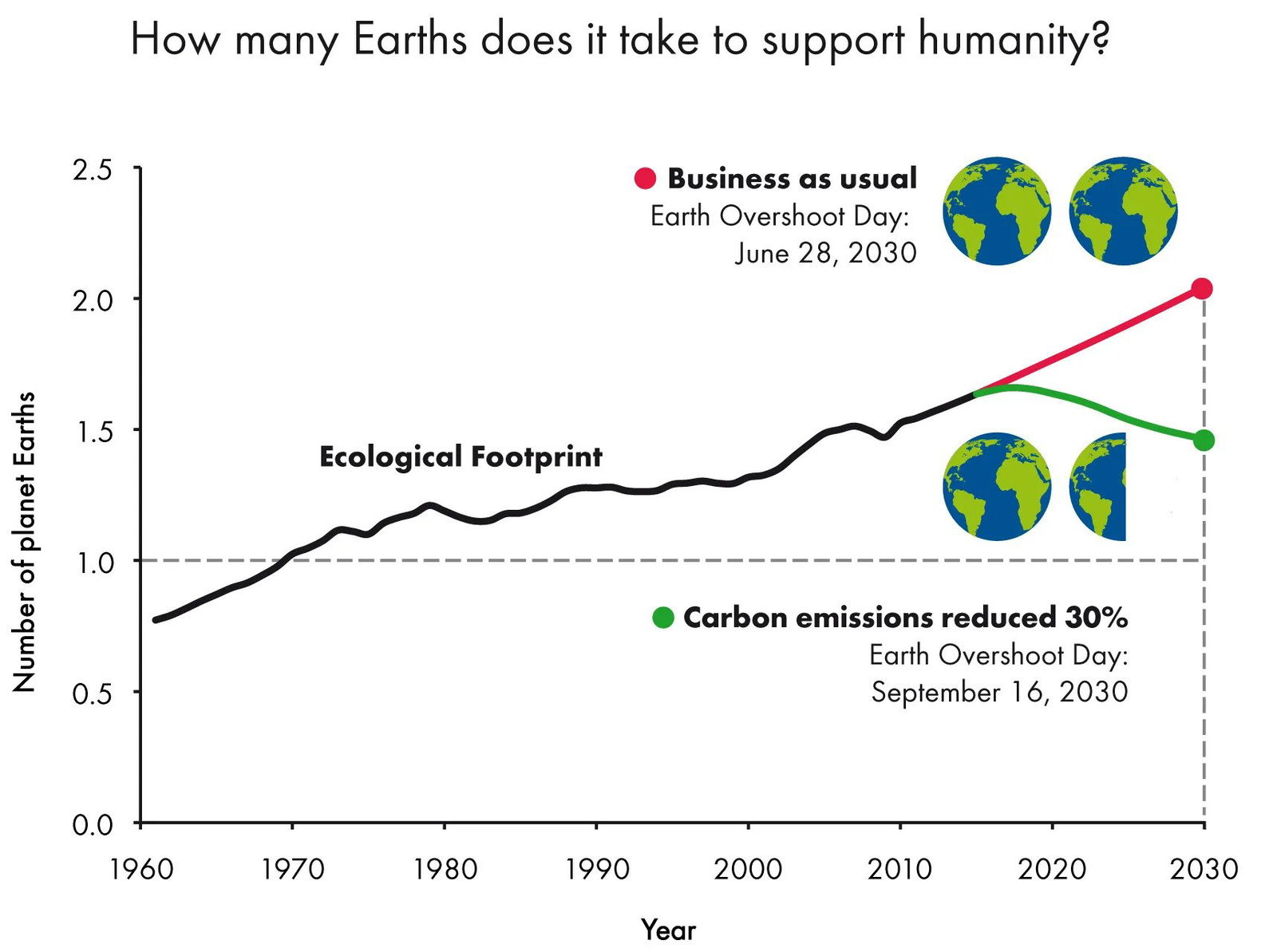Rolling back Earth Overshoot Day


· 7 min read
Humanity first overshot the Earth’s annual regenerative capacity in the early 1970s. That is to say, our species reached a point where every year we started to consume more resources and produced more waste than the natural bioproductivity of the planet and ecosystems functions are able to regenerate and safely absorb in a year. In other words, we started to live off the capital that life built up over millions of years rather than taking the wiser path of making do with living off the annual interest on that capital. We are drawing down the natural capital account and in the process are diminishing the capacity of ecosystem functions to regenerate.
According to the Global Footprint Network which developed this measure together with the New Economics Foundation, the first Earth Overshoot Day fell on 23rd December, 1970. Rapidly rising population numbers and rates of material and energy consumption, along with the accelerating erosion of ecosystems everywhere have resulted in the decline of the planet’s annual ‘bioproductivity’ and a reduction in ecosystem functions each year since. Thus, the day on which we overstep the limits of Earth’s annual productivity is occurring earlier and earlier. By 1995 it was on 10th October, in 2005 we reached overshoot by 3rd September (Global Footprint Network, 2008), and in 2015 we reached it on 13th August (based on National Footprint Accounts, 2015 edition).
Figure 1 illustrates how humanity as a whole went into ecological overshoot (using more resources than one Earth can provide) in 1970 and how we will have to try to return to ‘one-planet living’ as soon as possible, ideally by 2050.
Figure 1. Earth Overshoot

Moving towards a regenerative human culture depends on first stopping and then reversing this steady trend towards Overshoot Day occurring earlier and earlier each year. Until one day in the future we can celebrate the fact that Earth overshoot day exists no longer and we have collectively managed to meet human needs within the limits of the planet’s capacity to regenerate and provide.
Sounds idealistic and utopian? Well, the science is simple: there is no other way to chart our path into a distant future on this planet. We need to first roll back Earth Overshoot Day and then begin to create a culture that aims to leave a richer, more vibrant and more ecologically productive planet to each subsequent generation. To achieve this transformation we will need the participation of all of humanity. We will need open and free education for all to raise everyone’s ecological and social literacy.
The narrative of separation has taught us how to see the world through the lens of difference, competition and scarcity — consequently we learned to compete. The narrative of interbeing reveals not only our interdependence but also the abundance that emerges from collaboration, sharing and caring for the whole community of life. We need to learn together how to collaborate effectively in nurturing the social and ecological capital of our communities.
I refuse to believe that ‘human nature’ is mainly competitive and individualistic; as a matter of fact, I am convinced that, by and large, the opposite is the case (see evidence for this in Chapter 7). We all have the capacity to understand that humanity’s future depends on learning to live within the biophysical limits of the biosphere. War and fundamentalism are deeply anachronistic. It is time for humanity to come together and learn how to become a regenerative presence on Earth.
I am writing these lines while the news is full of the conflicts in Syria, Iraq, Israel/Palestine, Afghanistan, Libya and Ukraine. In asserting our fundamentally collaborative human nature I am not ignoring these horrors. Why are so many young people willing to join terrorist organizations fighting with blind hatred, barbarous brutality and complete disregard for the values of peaceful co-existence shared by all the world’s religions?
I believe many young people — particularly men — are disenfranchised and hurting from the lack of meaning propagated through the effects of the narrative of separation, desperately looking for a place to belong. The misguided ideologies that drive war, fundamentalism and conflict attract people who are looking for meaning and identity by creating an other to oppose.
Imagine humanity united in the meaningful work of creating a more thriving future for all of life. From within the narrative of separation this might seem like a naïve vision. From within the narrative of interbeing, and in full awareness of our dependence on the planetary life-support system and ecosystems functions, to do anything else and waste time in the fight between maladaptive ideologies is deluded.
To care for the Earth and to care for others is to care for ourselves. Let’s find meaning in co-creating a thriving world together, rather than in fighting each other blinded by outdated ideologies and divisive narratives. Let’s roll back Earth Overshoot Day! Let’s find that higher ground of interbeing that lies beyond all our differences. Let’s value our diversity as we come together in global unity.

This piece is based on an excerpt from Designing Regenerative Cultures. illuminem Voices is a democratic space presenting the thoughts and opinions of leading Sustainability & Energy writers, their opinions do not necessarily represent those of illuminem.
Gokul Shekar

Effects · Climate Change
Michael Wright

Agriculture · Environmental Sustainability
Simon Heppner

Effects · Climate Change
The Ecologist

Pollution · Public Governance
World Economic Forum

Green Tech · Nature
The Guardian

Biodiversity · Nature